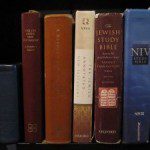Classes have begun, and it’s heavy. I spent today reading Schleiermacher’s On Religion and a book about the religiously motived Christian-on-Muslim violence of the Bosnian war. Below, then, my notes on these chapters of Helaman.
Hel 6:1-2 Ironically, now the Lamanites are the converted and obediant, while the Nephites are the rebellious. cf. v. 34. In v.4, although the term isn’t used, it sounds like the Lamanites send missionaries to the Nephites to bear testimony.
6:21 Most of the population belonged to one secret union or another, probably out of a sense of self-preservation. This is further balkanization of the people, breaking up into their own little units.
6:28 Mormon refers to what we would probably call “the tower of Babel” story, though he doesn’t use the name Babel. Rather, Mormon seems to refer to the heavily-edited Book of Ether, since he mentions “the people who came from that tower into this land; who spread the works of darkness and abominations over all the face of the land, until he dragged the people down to an entire destruction, and to an everlasting hell.” The interpretive detail Mormon gives, however, that they were “build[ing] a tower sufficiently high that they might get to heaven” isn’t found in Ether as we have it, in Moroni’s abridgement. It only mentions the “great tower” and “confounding of languages.” More on this when we get to Ether.
Hel 7:4 and 8:8, aright is an adverb meaning “Rightly; in a right form; without mistake or crime.”
Hel 7:7 The Good Old Days.© Things are always better “back then,” right?
Hel 7:17-19 Other than Alma 5, where the “good shepherd” appears repeatedly (5:38-41, 57, 60), this is the only other place in the Book of Mormon where God is characterized as “the good shepherd.” This imagery is most familiar to us from the New Testament (e.g. John 10), which itself is drawing heavily on Old Testament passages like Psalm 23:1 and Jeremiah 23:1-4, Indeed,
One of the oldest figures of speech which we possess is that of the Good Shepherd caring for his flock. Today a minister is frequently called “pastor”, which is the Latin word for “shepherd”; and quite often one hears reference made to his congregation as “his flock”. In ancient times the same expression was used of great rulers many centuries before the time of Abraham. The metaphor can be traced back through thousands of years to the pastoral origin of many of our cultural traditions.- G.E. Wright, “The Good Shepherd” in Biblical Archaeologist 2:4 (1939)
This passage continues with its Old Testament allusions. (Are they really allusions, or just similar language in similar kinds of speech?) Being scattered instead of gathered was one of the curses for violating the Mosaic covenant (Deu 28:64). And the “Repent repent, why will ye die?” echoes Jeremiah 27:13, Ezekiel 18:31-32, and Ezekiel 33:11.
Hel 8:6 “we know that this is impossible, for behold, we are powerful, and our cities great, therefore our enemies can have no power over us.” Don’t they recall the urban versions of the Titanic, the unsinkable ship? Jerusalem, which could not be destroyed (except it totally was, like Shiloh), or the walled city of Ammonihah (Alma 16:9-11)? See Jeremiah 7, 1 Nephi 2:13, and this article.
Hel 8:14 Moses and brazen serpent, which is later destroyed because people have started worshipping it (2Ki 18:4). As times change, the use of an object or idea or even a person may shift to become completely different than what it was intended for. This can be good, bad, or neutral. If it becomes bad, and is then gotten rid of, does that mean it hadn’t been revelatory or inspired in the first place? Did Saul do no good when he was first king? Or Amasa Lyman when he was first called as an Apostle? (He was excommunicated for apostasy in 1870 after repeatedly preaching the non-necessity of Jesus and the Atonement.)
Hel 9:21 “uncircumcised of heart.” C.f. Deuteronomy 10:16, Deu 30:6, Jeremiah 4:4. Joel 2:13.
Hel 9:25, 14:1 and signs. Cf. 5:50 and signs. Matt 16:4. Are signs for those who believe or don’t? Should we seek signs? Jdg. 6 has a postive story about doing so, and D&C 129 commands it under certain situations. What kind of signs, then? Do signs confirm, but don’t establish? Jesus clearing the temple. John 2:18 They ask a sign. (What’s a sign? Sign seeking. Moses is given signs for the people in Exo 4:8. But sometimes we ask for signs. Isn’t the Holy Ghost a sign we ask for? Other signs? Isa 7. Gideon in Jdg. 6. What about D&C 129? Jews are asking for proof of his authority.) What does he offer them? V. 23 People recognize Jesus by the signs he does, the signs of the messiah(John 3:2, Matthew 11:1-4). What is the result of this sign of Nephi’s? Hel. 10:13. Just like Jesus parable in Luke 16:31.
Hel 10:5-7 God gives Nephi his own power, in a sense. It’s called “power to seal” but seems to have much different application than sealing today. God can hand over the keys, as it were, because he trusts Nephi to do what God would do. (Compare Bruce Almighty, which is worth watching in spite of Jim Carrey. I do like Morgan Freeman as God.) This has always reminded me a bit of some Hugh Nibley passages talking about trust, power, deification, and the oneness of God.
What does this do to the oneness of God? It doesn’t do anything at all to it. In nothing is the idea of the real oneness of God more convincingly apparent than in the contemplation of the real cosmos…. But the one God always remains in control. For only on condition of being exactly like him can souls take the next step. God will trust you to represent him, to act for him, only if he knows that you will do exactly what he would do in all circumstances. Then he can leave you alone. He trusts you. You’re like him — a perfect identity, as far as your function is concerned. You can just carry on his work. It’s like arriving at the same answer to a problem. He will trust you only if he is sure you will come out with the same answer as he did.” -Hugh Nibley, Temple and Cosmos– 287
“We are here for the purpose of being saved, and we must also be safe. Exaltation is something more. All will be saved in the kingdom of God, but who is safe? Who can be trusted? With reference to man’s responsibilities, we are here to be tested whether we can be trusted to take charge on our own, because if you can be trusted completely, you’d do the very same thing God would do. You’d represent him completely. So there is only one God, only one ruling mind, and only one pattern after all. The oneness of God is never jeopardized here. The Askew Manuscript says, “There are many mansions, many regions, degrees, worlds, spaces, and heavens, but all have but one law. If you keep that law, you, too, can become creators of worlds,” an astonishing statement.” -Nibley, Old Testament and Related Studies, 142
Spiritual power does not come to one who cannot wield it as God would.
As always, you can help me pay my tuition here, or you can support my work through making your regular Amazon purchases through this Amazon link. You can also get updates by email whenever a post goes up (subscription box on the right). If you friend me on Facebook, please drop me a note telling me you’re a reader. I tend not to accept friend requests from people I’m not acquainted with.











